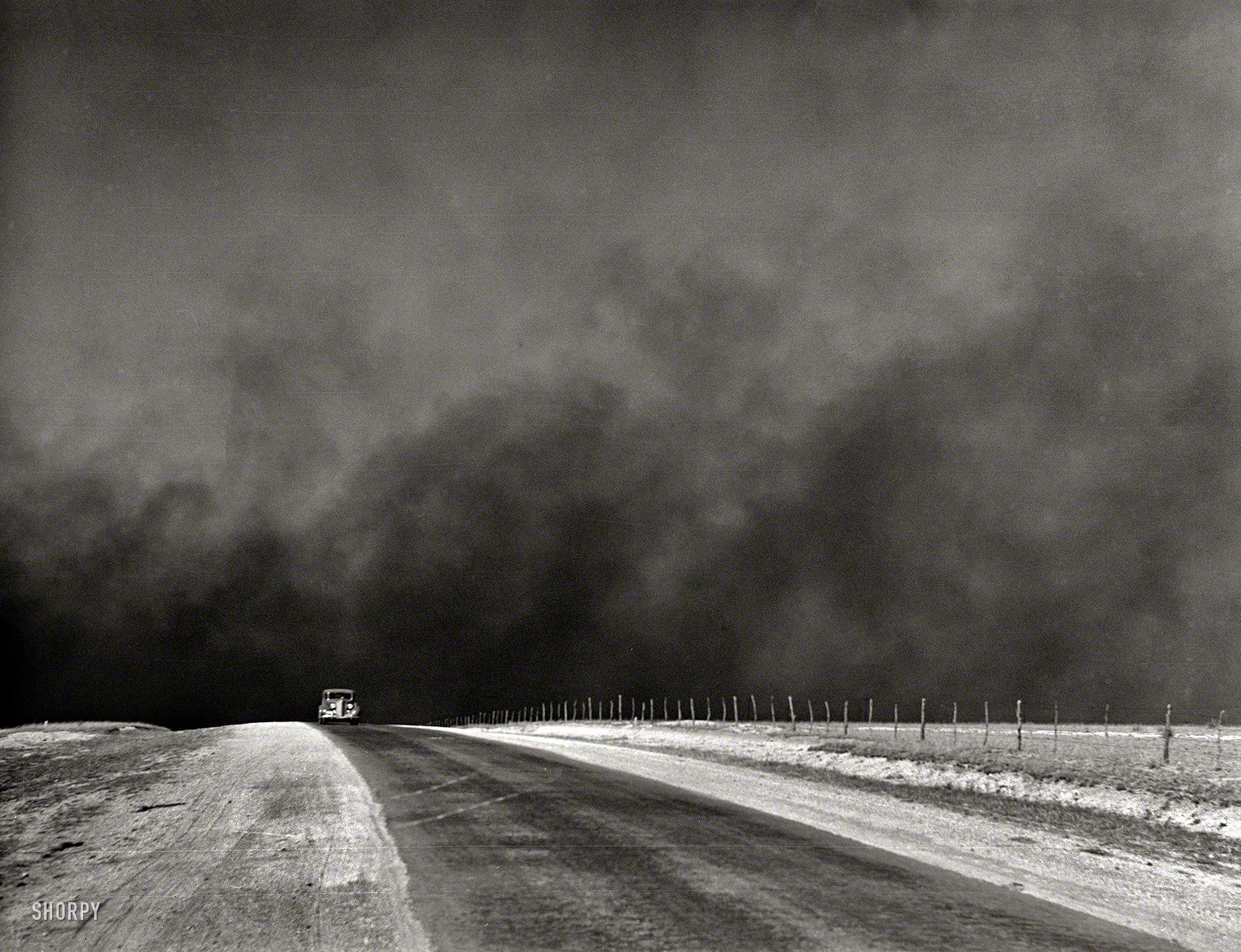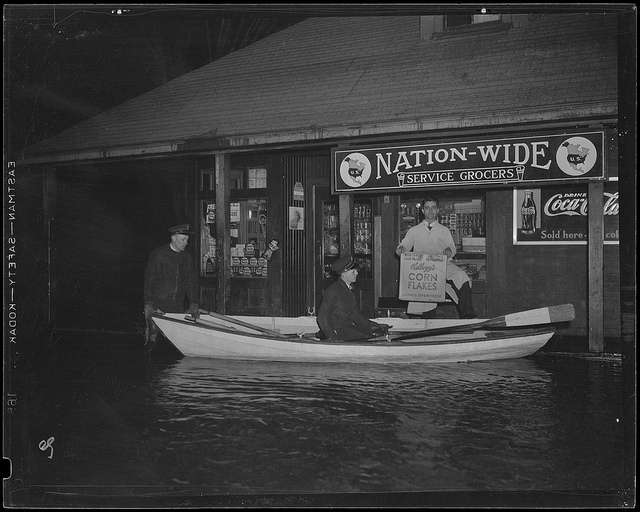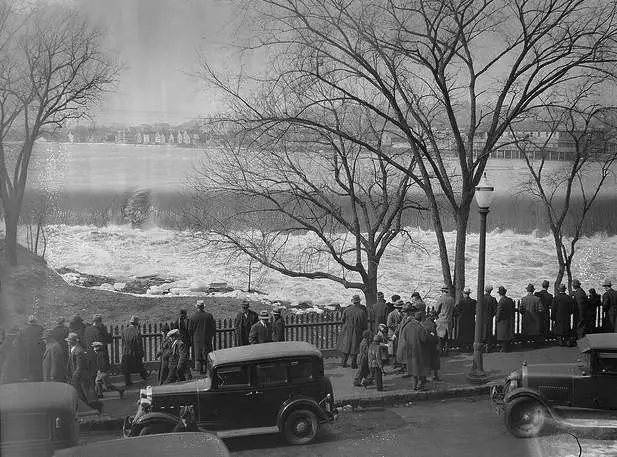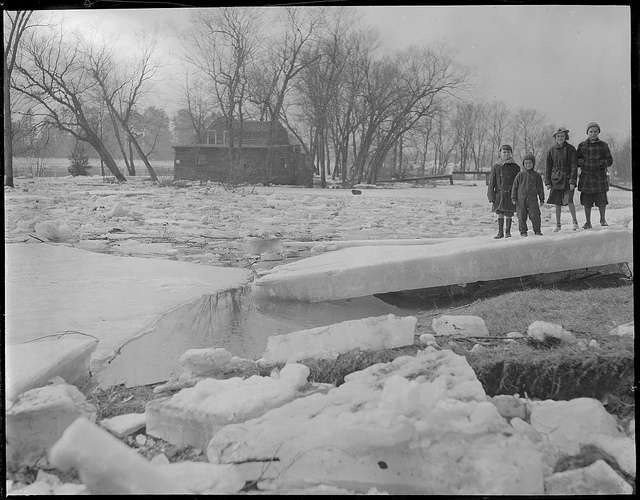|
|
Post by linefacedscrivener on Feb 8, 2021 10:13:36 GMT -5
 "A regard for fact forces me to the statement that most of the outlawry in the West was the result of conflicting forces engineered from the outside. The period of Southwestern outlawry at its wildest, was between 1865 and 1885; especially in the years immediately following the Civil War. Texas was in the grasp of the carpet-bag vultures, who were only intent on looting the state . . . the carpet-bagger had Federal soldiers behind them. Resistance against oppression resulted in outlawry; men were hunted like mad dogs simply because they tried to protect their property andtheir lives and the lives of their family. And they were trying it on the wrong breed. Wars? I could tell you of wars; of ambushes and midnight raids and men kicking at the ends of ropes, and rolling out of their saddles in the teeth of a blast from the thickets. In such conditions the men I have mentioned grew up; they were neither thieves nor train-robbers nor hiwaymen, though a few, because of the conditions under which they lived, became such in later life." -Robert E. Howard to H.P. Lovecraft, July 1933
Robert E. Howard definitely showed animosity toward the Carpetbaggers as the harm they caused to Texas was no doubt still felt by the generation before him. In many letters to Lovecraft, he rails against them, and T.R. Fehrenbach does not hold back either in his Lone Star: A History of Texas and the Texans:"The corruption and extravagances of the Carpetbaggers, which reflected the worst of Anglo-American politics, have been easily seen. The rise of a new mercantile and landowning class with them in Texas has not been so clearly marked. The almost complete destruction of the old planter gentry, not by the war but in its aftermath, escaped attention. But it is a truism, if not universally true, that few families that had wealth or station prior to 1860 survived the following two decades with either" (419). Howard and Fehrenbach certainly seem to agree on this topic. |
|
|
|
Post by linefacedscrivener on Feb 9, 2021 10:09:42 GMT -5
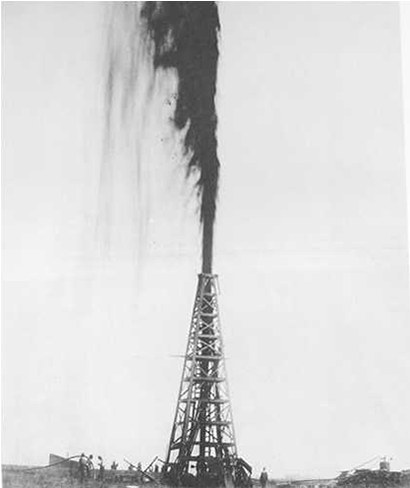 "If [Rio Grande] valley industry follows the trend of American industry as a whole, the big corporations will soon begin to freeze the independent fruit-growers out of business. Raising taxes and holding down the price of the fruit will do the job. I seem to see, in the future - perhaps twenty, thirty, forty years - the Lower Valley groves owned almost exclusively by big corporations, and settled and worked by Italians. All this is not for publication. Its none of my business - I don't own a foot of land in the world, or a blade of grain, or the bark on a mesquite tree. But I’ve seen the big cattle corporations crush out the small ranchmen, and the big oil companies freeze out the independent oil men. Its the trend of the times." -Robert E. Howard to H.P. Lovecraft, March 2, 1932
I want to move this forward to the end of T.R. Fehrenbach's Lone Star to show that not only do Fehrenbach and Howard agree on the history of Texas, but Fehrenbach appears to also agree with the insights that Howard had about the times in which our favorite author lived. In the quote above, and in so many other letters, Howard rails against the large corporations from out of state coming into Texas and taking over the businesses of the common man. In doing so, outside interests came to control Texas and he saw those outsiders as essentially soulless people. As he once wrote of Cornelius Vanderbilt, "damn his filthy soul." Fehrenbach echoes this sentiment in his book: "Texans, like many other 19th century Americans, had a historic antipathy to corporations, not so much because of what corporations did but because the idea was strongly held that no 'soulless enterprise' should be equated with human beings and given the protection of the laws." Though moving up to about the time Howard wrote the letter above, Fehrenbach also adds: "Texan morale and fundamental concepts of society were undamaged by 1929, because the majority of all Texans had never believed in Wall Street." Like Howard, they did not trust the soulless corporations which traded on the market. |
|
|
|
Post by linefacedscrivener on Feb 10, 2021 15:15:06 GMT -5
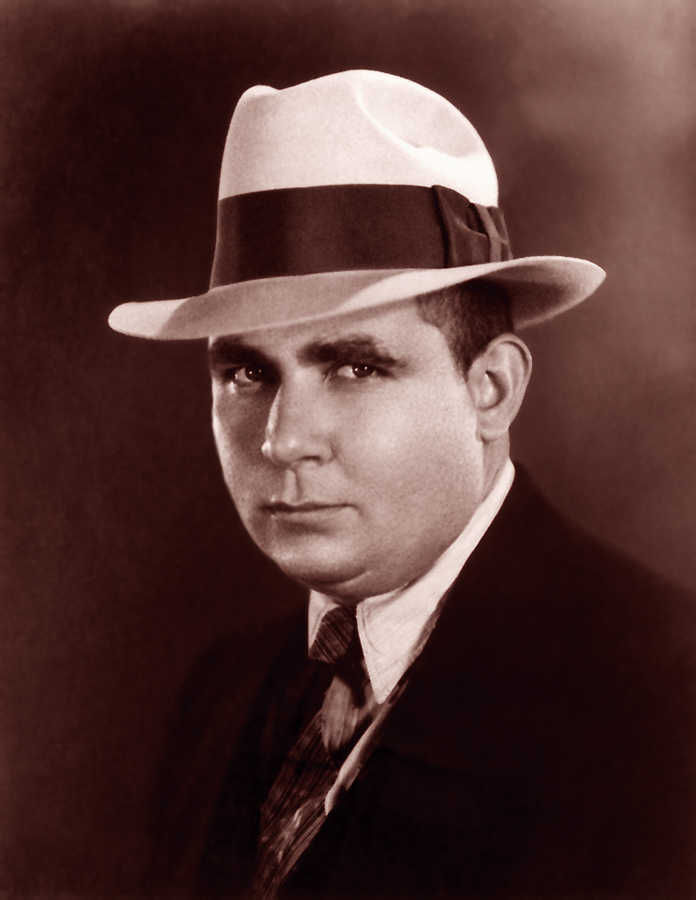 "Returning to the question of the pioneers: you say the pioneer age was no Golden Age. When did I ever say it was? True, I once said that I wish I could have lived on the Texas frontier. I repeat that wish. But what do you find in that statement that leads you to believe that I consider the pioneer epoch as “ ideal”? You prefer to live in New England. But you’d be surprized and resentful if I accused you of considering New England as an ideal region without flaw, or the 20th century as a Golden Age. Why then should you conclude that my wish to have lived in early Texas reflects a belief that it was perfect? I simply say that in spite of its unquestioned drawbacks and hardships, the time and place suited my particular temperament better than any other . . .The trouble with your point of view is that the frontier is so alien to everything you personally like and desire that you don’t see anything good at all about it. To you it seems merely a ghastly, hideous welter of blood, violence and misery with no compensating features whatever. But I see another side of it, which I find impossible to explain to anyone who is personally unfamiliar with pioneer and semi- pioneer life. Why abuse me because I’m close enough to that region and era to see the good as well as the bad of it?" -Robert E. Howard to H.P. Lovecraft, May 13, 1936
In his last letter to Lovecraft, Howard defends his position on desiring to have lived on the Texas frontier, a frontier for which he was only one generation removed. Much of Howard's literary work deals with life on the frontier, and particularly about the differences between civilization and barbarism. Toward the end of Lone Star: A History of Texas and the Texans, T. R. Fehrenbach hits on many of these same themes when he addresses and says the very same things, I believe Howard would have written, had he lived to write his own history, An Unborn Empire. "A barbarian awareness of true danger can be an asset to any society, as well as a barbarian willingness to believe that straight action, not interminable moral confusion, is sometimes required" (p. 653). "The 20th century presented different problems, in an altered milieu. When one Ranger captain, in the 1920's, shot the tires off the car of a state official who had refused his command to halt, Texans smiled at his toughness. But this man, and those Rangers who solved law enforcement problems by squaring away and requesting the other party to draw if he dared, were relics of a frontier that, although it loomed large in Texans' minds, had disappeared" (p. 692). "The history of Texas was unique in North America, but never unique or even unusual in the world of man. It was an old, old story: new peoples, new civilizations impinging upon the old" (p. 708). "As always, the end of the expanding frontier and the refinement of civilization behind it forced the nation to feed upon itself" (p. 709). "Warrior values made Texans respectful of the rights of peers, much as all Indian braves were essentially equals when not on warpath" (p. 719). "The Texan image, everywhere, was dryly and assertively masculine; this, too, shaped the native culture" (p. 719). And his closing paragraph to the book: "The sun would remain, while men must die. The moon would rise again, while civilization fell. In the end would be the earth. Texas, under any name, would go on forever" (p. 725). |
|
|
|
Post by linefacedscrivener on Feb 12, 2021 15:06:48 GMT -5
 “The fact that I enjoy watching athletic sports, and have in the past enjoyed in participating in them, does not mean that I accord sheer muscle the undivided worship you appear to think I accord it. Each man has his hobby; because Frank Buck studies and captures animals and makes his living by it, nobody supposes he places lions and tigers above human beings, or desires to divest himself of his garments and live in the jungle with them. Because I love to watch, discuss, write about and occasionally participate in physical contests, does not necessarily mean that I despise everything else in the universe, and would like to be a mass of mindless brawn. Nor have I ever advocated over-athleticism, what- ever that may be.” —Robert E. Howard to H.P. Lovecraft, March 6, 1933 I like the fact that Howard mentions Frank Buck (pictured above). I had an interesting childhood. I grew up in the 1970s and also the 1930s. The 1970s because of my chronological age, but the 1930s because my Dad bought and sold old antiques, mostly advertising, toys, premiums, pulp magazines, big little books, etc. Naturally, as I was a reader, I got to read all of the pulps, comics, and big little books he had. One early book that he had purchased to sell was this one: 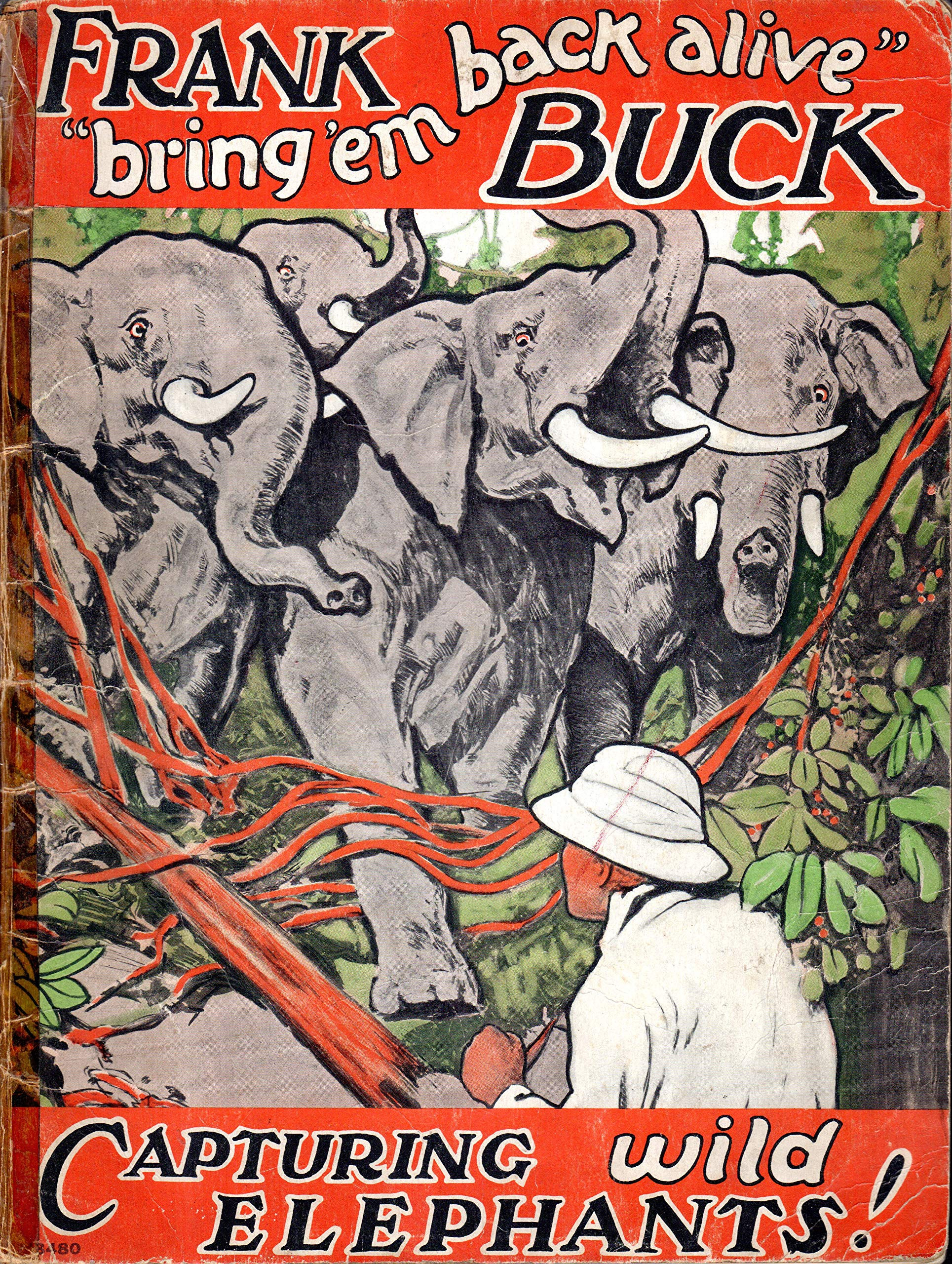 This was my first introduction to Frank Buck and I must have read it a half-dozen times or more. Frank Buck was wildly popular in the 1930s, and reading about him and watching some of his movies in the 1970s, I could see why. So, since Howard mentioned ole' Frank Buck, I thought I would introduce him--or reintroduce him--to some of you. I plan to do a series of several posts on him, but in short, Frank Buck was a big game hunter for the American Zoos, which is why he also had the slogan associated with his name: "Bring 'em Back Alive!" Here is a good introduction to Buck: the short film "Frank Buck and the Man Eater": |
|
|
|
Post by linefacedscrivener on Feb 23, 2021 14:29:04 GMT -5
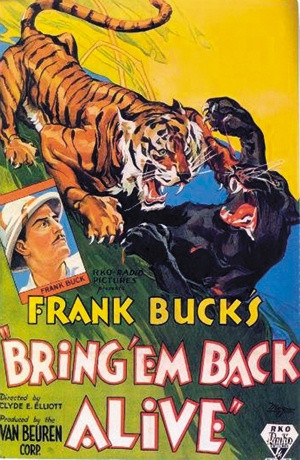 ". . . because Frank Buck studies and captures animals and makes his living by it, nobody supposes he places lions and tigers above human beings, or desires to divest himself of his garments and live in the jungle with them.” —Robert E. Howard to H.P. Lovecraft, March 6, 1933 Well, I thought I was going to post on Frank Buck last week, but that crazy winter storm, in Texas of all places!, kind of put things off for a bit. So, back to Frank Buck . . . Frank Buck was born on March 17, 1884 in Gainesville, Texas, north of Dallas and Fort Worth. As he grew up, he had many interests, but one was to actually leave his native state. He headed to Chicago. He worked in a number of jobs, including one as the captain of bellhops. While there, he met and fell in love with an actress by the name of Lillian West. He was 17, she was 46. Almost 30 years difference between them. They got married. In 1911, he played in a high-stakes poker game and won $3,500. That is almost a hundred grand in today's dollars. He decided to use the money to fund a trip to Brazil without his wife, their ten year marriage not going as well (she was now 56). He landed on the idea while down there of bringing back some exotic birds and selling them in New York. It worked and he made a huge profit. So, he started doing this full-time and, since he was traveling so much now, he divorced his wife. He traded her in for a younger model and was married the following year. That was 1913. Because of his contacts through the animals he was brought on as the full-time director of the San Diego Zoo. That didn't go well, so he began working with zoo's to provide them the animals they needed. Zoos were beginning to proliferate in America at this time. He also ended up with contracts with the Ringling Brothers and Barnum & Bailey Circus, which was in its heydays at the time. In 1927, Buck again traded in his wife for a newer model, but this time the marriage stuck. It was also at this time that things began to take off for him. He began writing articles and he co-authored the book that made him famous, Bring 'Em Back Alive. Soon, he was starring in documentary shorts, then movies, more books, and he went to work for Ringling Brothers. He was very much a showman, overplaying his exploits, but the audiences loved it as more often than not, they had never seen some of these animals. World War II put a damper on his business, but when it was over, he returned to collecting live specimens. He also made his last film appearance in the 1949 Abbott and Costello movie Africa Screams.
In the end, he reconciled with his native state of Texas and came home, living in San Angelo. He died of lung cancer on March 25, 1950. Here is a fun video of Frank Buck wrestling a python back into his box. |
|
|
|
Post by linefacedscrivener on Feb 24, 2021 15:49:30 GMT -5
 ". . . because Frank Buck studies and captures animals and makes his living by it, nobody supposes he places lions and tigers above human beings, or desires to divest himself of his garments and live in the jungle with them.” —Robert E. Howard to H.P. Lovecraft, March 6, 1933 So, this is going to be a pretty self-indulgent post about Frank Buck. As I mentioned, my dad bought and sold old antiques, posters, and premiums. I grew up reading the old pulps, big little books, and having access to things like the Little Orphan Annie decoder ring. My childhood was in the 1930s, but I was not that old. Here are some things I remembered regarding Frank Buck: This was a Big Little Book we owned and I read: 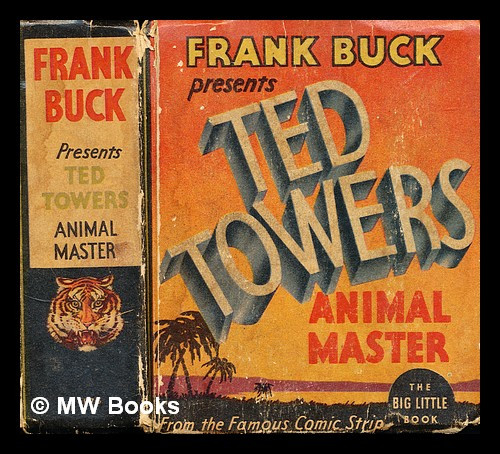 This was a Classic Illustrated Comic: 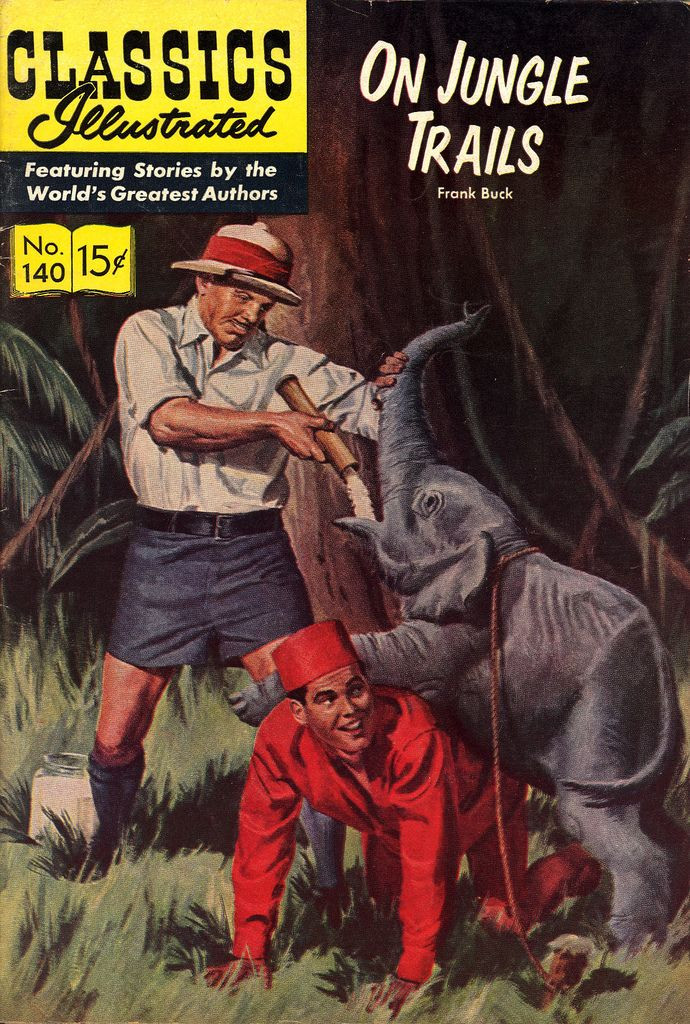 This was a premium that a kid could order with so much money and so many box tops, which we had: 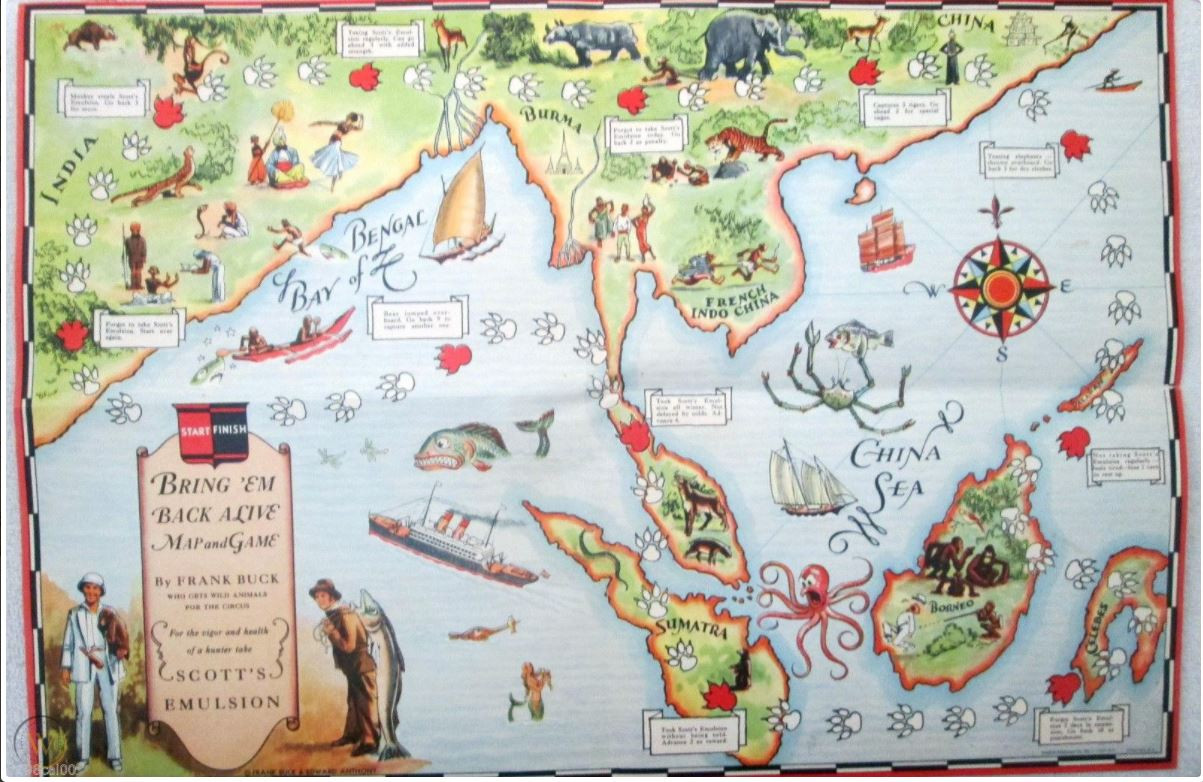 We had this poster from when Frank Buck joined the Circus: 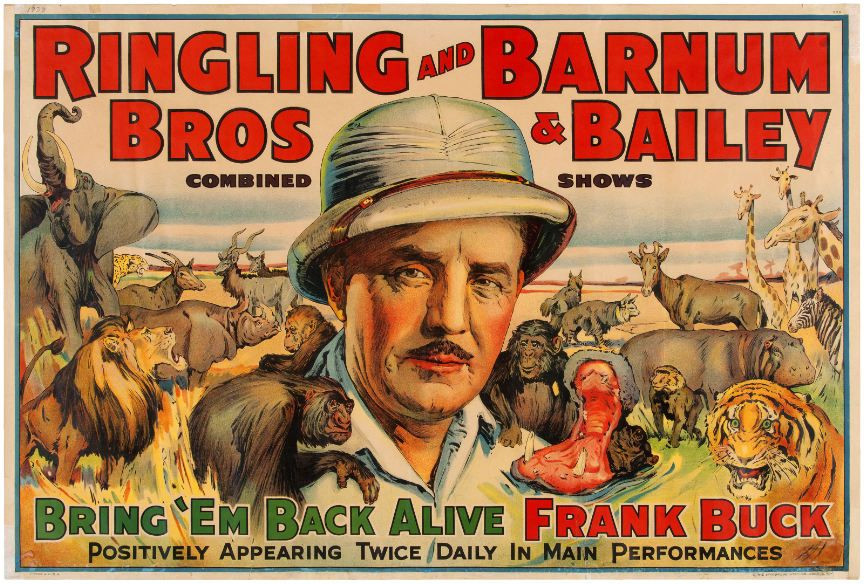 Here were some of the cool premiums we also had. I wanted to join the Frank Buck Club, alas, it was defunct: 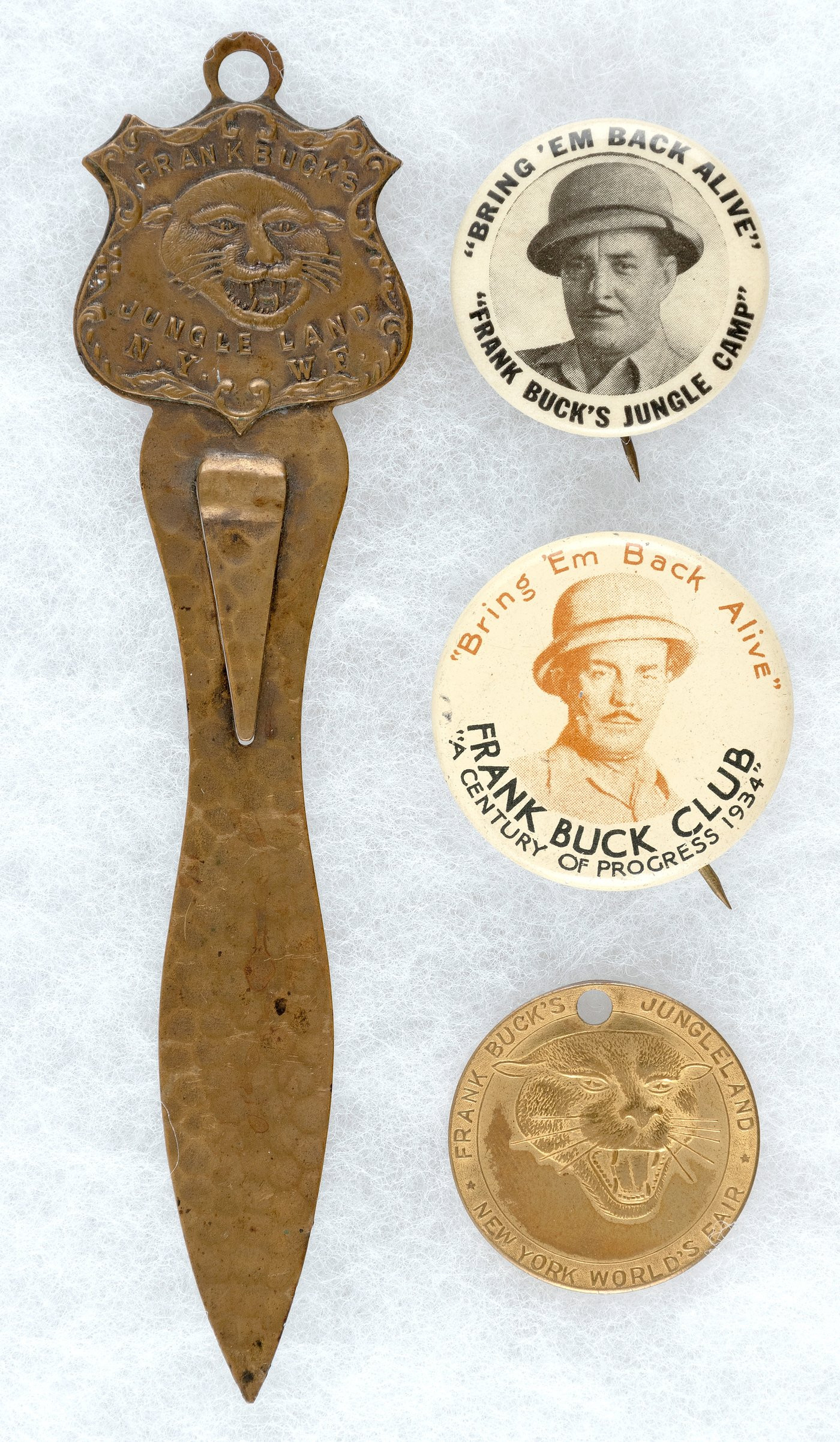 Topps had a trading card series featuring Frank Buck (I don't think we had them all. I don't remember Frank punching a gorilla for stealing his belt!!??)  And one more item I remember reading was this book that was based on the movie:  Oh, and speaking of movies, here is a clip of Frank Buck from the Abbott and Costello movie, Africa Screams: |
|
|
|
Post by linefacedscrivener on Feb 25, 2021 15:32:27 GMT -5
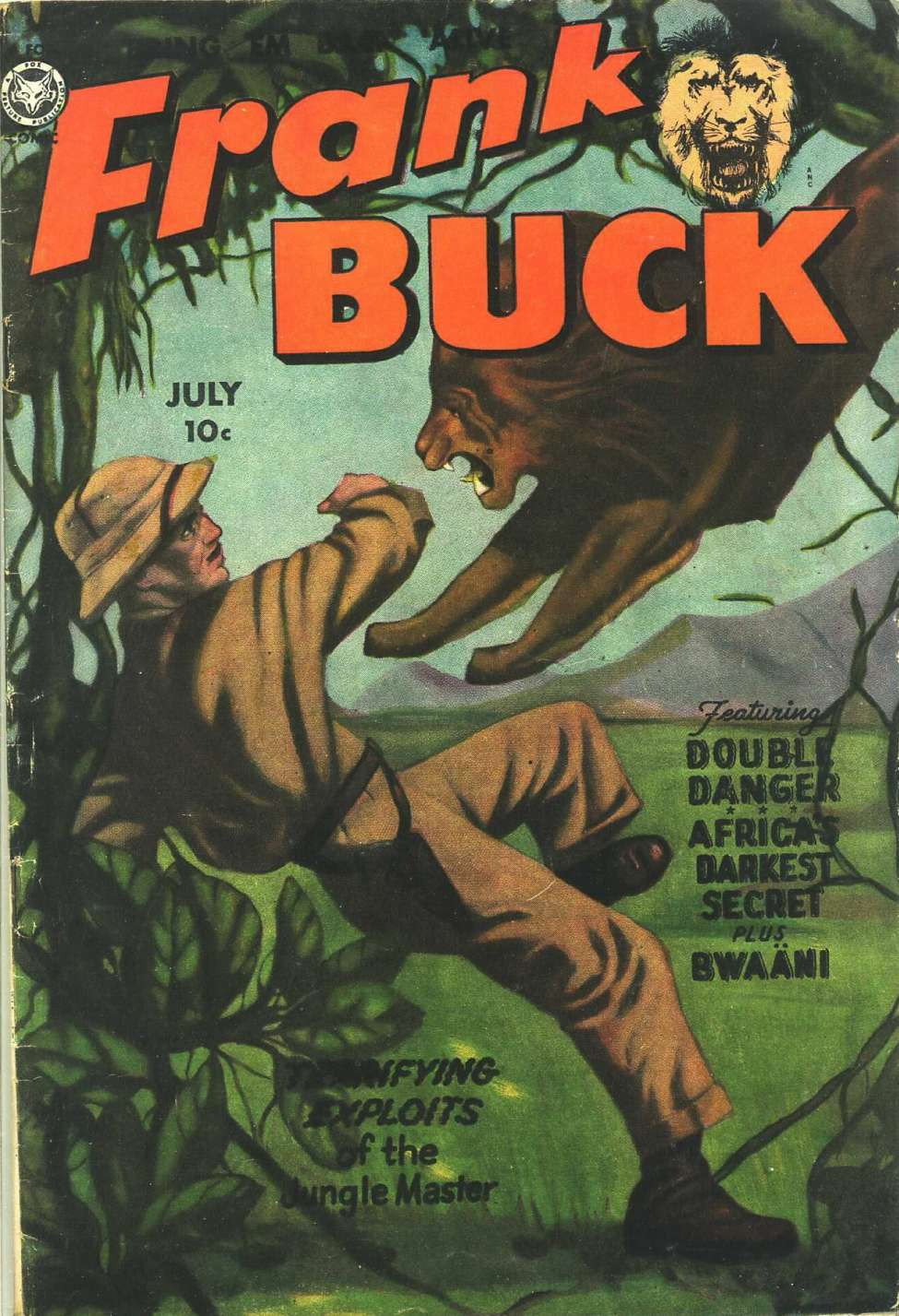 ". . . because Frank Buck studies and captures animals and makes his living by it, nobody supposes he places lions and tigers above human beings, or desires to divest himself of his garments and live in the jungle with them.” —Robert E. Howard to H.P. Lovecraft, March 6, 1933 One more post on ole Frank Buck . . . I remember in high school that I got excited when I saw they were making a television show of Frank Buck appropriately called, "Bring 'em Back Alive." It was pretty cheesy, but I still watched it: And after moving to Texas, I learned that up in his old hometown of Gainesville there was a Frank Buck Zoo: |
|
|
|
Post by linefacedscrivener on Mar 10, 2021 8:49:02 GMT -5
|
|
|
|
Post by linefacedscrivener on Mar 23, 2021 9:33:09 GMT -5
 “You mentioned that you were interested in the bad-men of the early days. So am I, intensely. However, if you’ve made a study of them, you probably know more about some of them than I do. Anyway, if you wish, I can give you some of the low-down on …Ben Thompson … [and] King Fisher … swashbucklers of the frontier. There’s nothing I enjoy more than discussing these picturesque old scoundrels.” -Robert E. Howard to August Derleth, ca. Dec. 15, 1932 Ben Thompson was a colorful character for he found himself on both sides of the law, at one time the City Marshal of Austin and another, murderer. In Howard's quote above, he also mentions another colorful Texan, John King Fisher. The two were fated to meet. John Bullard, a retired lawyer and huge fan of Howard has been writing a number of articles of late that are fantastic. Well researched, well written, and focused on Howard's passion for the Southwest, he recently posted this new article: “ 'There’s Nothing I Enjoy More Than Discussing These Old Scoundrels.' Robert E. Howard on Ben Thompson and John King Fisher, Two Texas Gunfighters" on Adventures Fantastic. Link here for an excellent article right up this thread's alley: adventuresfantastic.com/theres-nothing-i-enjoy-more-than-discussing-these-old-scoundrels-robert-e-howard-on-ben-thompson-and-john-king-fisher-two-texas-gunfighters/ |
|
|
|
Post by linefacedscrivener on Apr 19, 2021 15:08:45 GMT -5
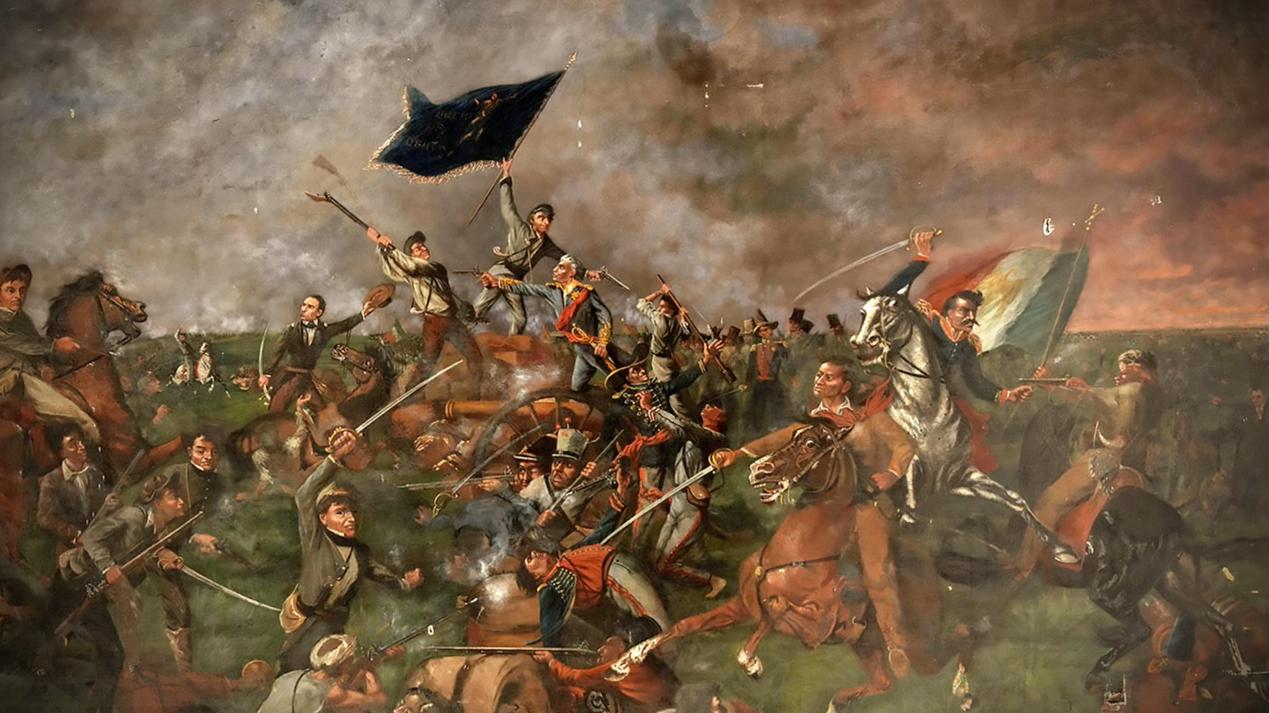 "If I could choose the age in which I was to live, I can think of no better epoch than this: to have been born about a hundred years earlier than I was, to have grown up on the Southwestern frontier, to have fought through the Texas Revolution and taken a part in San Jacinto . . ." -Robert E. Howard to H.P. Lovecraft, August 10, 1931 The Texas Historical Commission, along with a number of benefactors and groups, have created a video series called San Jacinto: A Lone Star Shines, to celebrate the 185th San Jacinto Day, which honors the battle that took place on April 21, 1836. Today was the release of the first. It is not bad, but none of the actors are professional, not even close. Still, A for effort. If you can be forgiving of that fact, here is the first installment, an eleven minute video: |
|
|
|
Post by linefacedscrivener on Apr 20, 2021 13:42:36 GMT -5
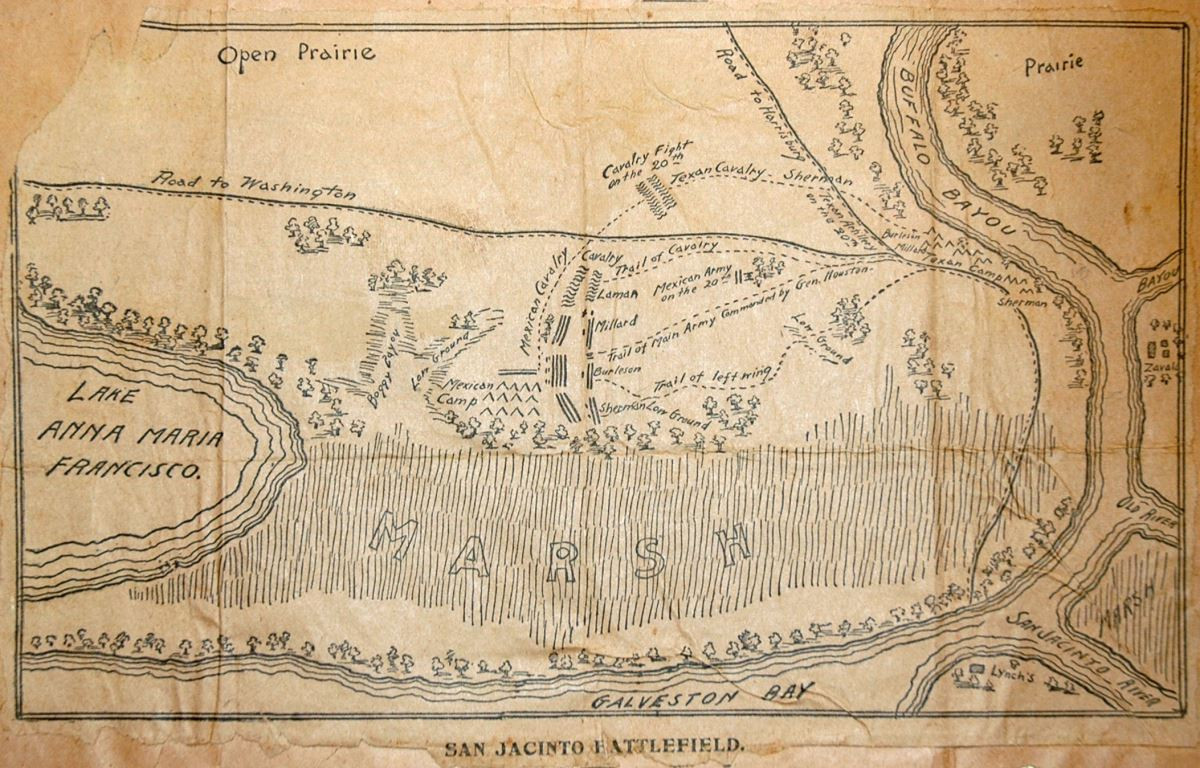 "If I could choose the age in which I was to live, I can think of no better epoch than this: to have been born about a hundred years earlier than I was, to have grown up on the Southwestern frontier, to have fought through the Texas Revolution and taken a part in San Jacinto . . ." -Robert E. Howard to H.P. Lovecraft, August 10, 1931 The video series is getting better as it is now dealing with the conflict. A very short video this time: |
|
|
|
Post by linefacedscrivener on Apr 21, 2021 13:37:59 GMT -5
 "If I could choose the age in which I was to live, I can think of no better epoch than this: to have been born about a hundred years earlier than I was, to have grown up on the Southwestern frontier, to have fought through the Texas Revolution and taken a part in San Jacinto . . ." -Robert E. Howard to H.P. Lovecraft, August 10, 1931 The cleanest battle I have ever seen fought on screen . . . still, it provides a good overview of what happened at San Jacinto. |
|
|
|
Post by linefacedscrivener on Apr 22, 2021 13:24:22 GMT -5
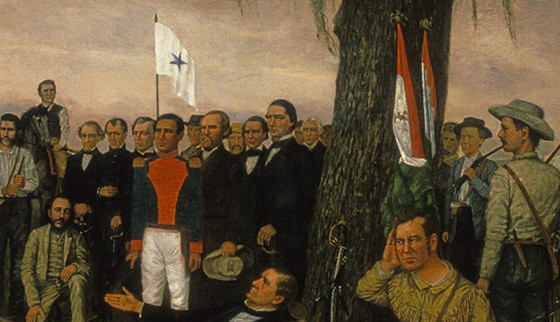 "If I could choose the age in which I was to live, I can think of no better epoch than this: to have been born about a hundred years earlier than I was, to have grown up on the Southwestern frontier, to have fought through the Texas Revolution and taken a part in San Jacinto . . ." -Robert E. Howard to H.P. Lovecraft, August 10, 1931 And, to finish off the Texas Historical Commissions' film series San Jacinto: A Lone Star Shines, here is the last video titled, "The Surrender." |
|
|
|
Post by linefacedscrivener on May 3, 2021 9:54:01 GMT -5
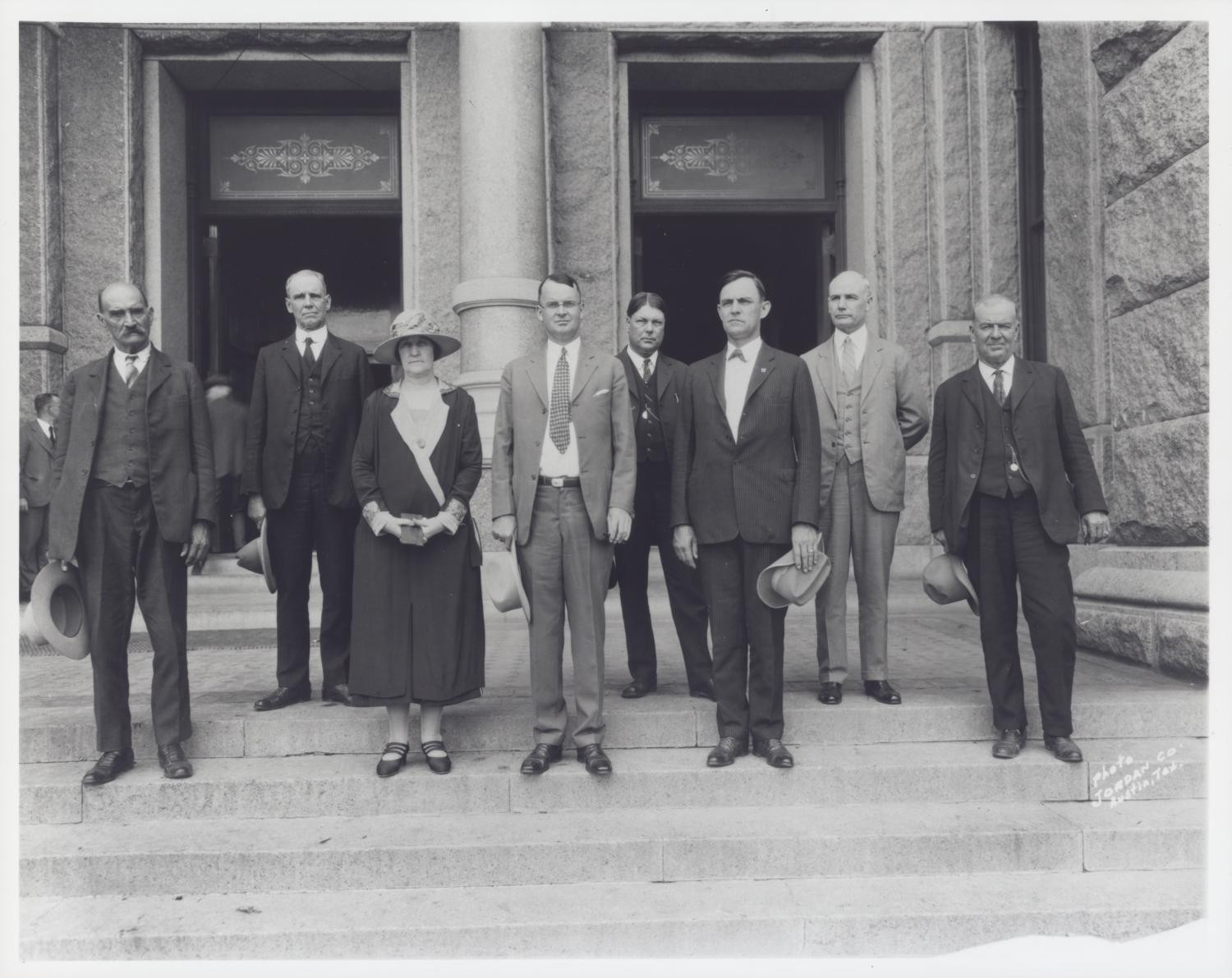 "And we’re going to elect Mrs. Ferguson governor again, or I miss my guess. Of course, Jim will be the real governor; he’d run himself, only he can’t, because he’s been impeached . . . I believe that there’s enough people in Northwest and East Texas to put a new governor in the capitol" -Robert E. Howard to H.P. Lovecraft, August 9, 1932
Howard was entirely correct. Ma Ferguson, pictured above with her rehired Texas Ranger (and many political cronies), was elected and Pa Ferguson continued to run the state. Moderns today put forth the idea that Ma Ferguson won in her own right and was a strong governor in her own right, not needing any help from Pa. That is most certainly historical revisionism. Just ask Robert E. Howard. And, he was right, eventually their overly corrupt ways and a shift in regional power brought Governor James Allred to power.
These three governors also had a huge impact on the Texas Rangers. The Ferguson nearly destroyed them and made them into political pawns, while Governor James Allred created the Department of Public Safety and strengthened the Texas Rangers.
The following video is from the Texas Ranger Museum in Waco, Texas, and it details the time period 1900 to 1935 - years within Robert E. Howard was alive and aware of Texas politics and the history of the Texas Rangers.
|
|
|
|
Post by linefacedscrivener on Jun 4, 2021 9:57:29 GMT -5
 "Pistols, shotguns, rifles – all played their part along the frontier, from the old twist-bore of the forest-runners to the Colts of the Rangers." --Robert E. Howard to August Derleth, March 23, 1933
Texas Governor Greg Abbott just recently signed a resolution that made the 1847 Walker Colt the official handgun of Texas. He made the statement, "It was invented by a Texas Ranger & was America’s first six-shooter. It was the gun of choice for US soldiers during the Mexican American war." I think Howard would have approved. 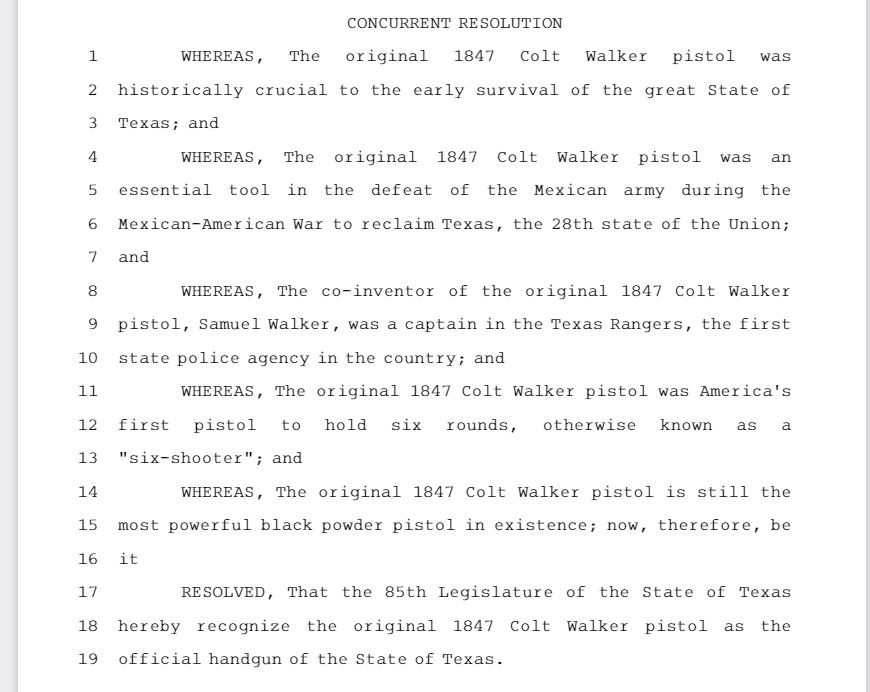 |
|
















